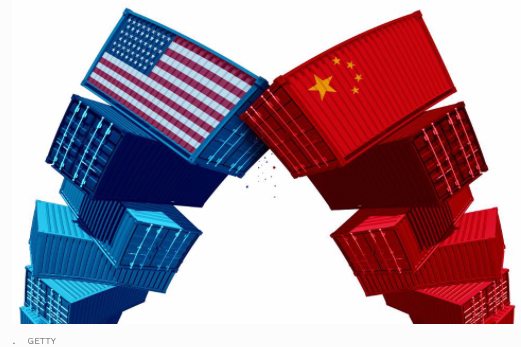US-China trade war – 3: Why we have a trade dispute
June 14, 2019

So, now that we have imagined a plausible end, it would be appropriate to understand more about the beginning. What started this trade dispute? Three main issues:
- A growing trade deficit: China sells a lot more goods to the USA than the USA sells to China. The trade deficit with China in 2018 was the highest on record: $419 billion.
- Inequalities of tariffs: Tariffs for the same product should be the same in each country. But they are not. For example: Cars imported into the USA are subject to a low tariff, but USA cars exported to China are subject to a much higher tariff.
- Intellectual property (IP): There are 3 main kinds of IP under consideration: (i) Brands, such as Apple, etc. must be protected. Namely, one cannot have companies running around the China market pretending to be Nike; (ii) Copyright content such as movies and books (think of black market copies of DVDs or Chinese translations of Harry Potter books) and (iii) corporate secrets and know-how, suchas how to make engines, design electronic systems, software, chemicals and other products should be protected, and if acquired, should be paid for.
How did these inequalities come about? There were really two categories of issues: General and specific to China.
General Issues
The USA has a trade deficit with most of the world, not just China, and it’s not necessarily a bad thing.
First, the US – China trade deficit amounted to $891.3 billion last year, the highest level ever (see NY Times) of which China accounted for less than half.
- Moreover, trade deficits, although they are politically unpleasant, are not necessarily bad for the USA or a sign of unfair treatment, but are rather a function of multiple factors, including investment flows, strength of the dollar, politics, and the strength of the respective economies.“All countries run trade deficits whenever they consume more than they produce.” (Kimberly Clausing).
- This points to two things: (i) Trump is picking a trade fight with most of our trading partners, not just China; and (ii) although pushing China to do more to diminish the trade deficit with the USA is justified, one cannot really blame China for the whole problem, and China’s efforts will not have a huge impact on the overall US deficit.
Two Issues Specific to China
All wasfine at the beginning, but over time the following issues evolved to become obviously unequal and unfair.
- Inequalities of tariffs: Way back when China was considered a third world country, an emerging economy in great difficulty, the USA and Europe wanted to encourage its growth.This made a lot of sense: politically, economically, and from a humanitarian point of view, helping China join the family of prosperous nations was a good idea. So, a beneficial tariff system was codified: it was agreed that China would place high import tariffs on certain products to protect and help develop its domestic industry.
- Intellectual property (IP): China’s IP issues were a sore point from the beginning but western governments were open minded and easy going because (a) China was a developing country in need of everything and it was initially unfamiliar with IP concepts and because (b) no-one was complaining loudly. Companies aiming to capture part of the emerging China market were so dominant that they did not want government interference. Quite the opposite. Even though, as the China market grew, they were often asked to share some of their IP “for free” or turn a blind eye on the stealing of some of their know-how, sales was their biggest focus and manyconsidered some IP encroachment an acceptable price for market access. Attitudes changed when real Chinese competitors emerged and the China market became less lucrative.
As for tariffs, helping China was a good idea 30 years ago and is still, fundamentally, a good idea today. So what has changed? Why is everyone so upset?
Two events changed the status quo:
- China’s economy became the world’s second largest in 2010 and continued to grow rapidly. In a way you could say that China became a victim of its own phenomenal success. It lifted 500 million people out of poverty and became a huge market for US and European goods. This kind of success creates jealousy and can be seen as threatening.
- Attitudes changed. First there was the GFC (Global Financial Crisis in 2007-8) and then there was the ascent of Xi Jinping. The GFC undermined the image of the capitalist system and made the communist old guard feel that China’s system was better. When Xi Jinping was elected President of the PRC in March 2013, he promptly abandoned the humble approach advocated by Deng Xiaoping and developed instead a strong man swagger to steer China towards a dominant position on the global stage.
This attitude of course clashed with that of the then new president of the USA. Trump had a businessman’s approach to world challenges and could not countenance unfair arrangements especially from a rising China who appeared to be thumbing its nose at the USA.
China’s unequal arrangements had to stop. You can’t claim that you are a superpower and then ride your bicycle around the neighborhood with training wheels on. These will have to come off. Even China would agree with that.
So the stage was set and negotiations could start. Could the two countries find common ground? We will next examine and try to clarify the position of each.
◊◊◊◊
